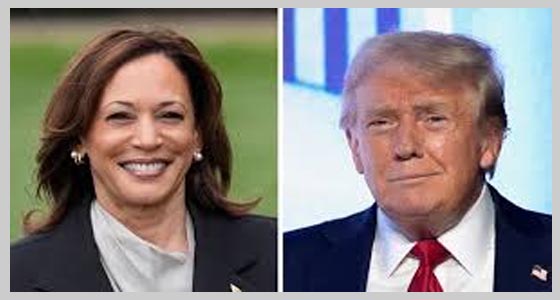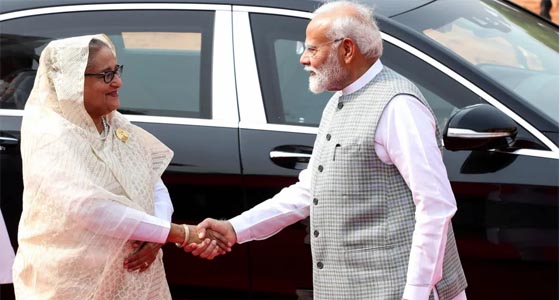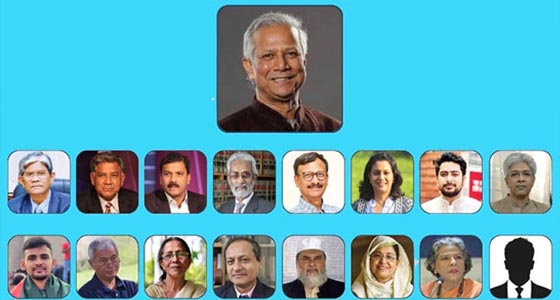The Trump vs Harris presidential debate
- Last Update : 08:42:26 am, Thursday, 12 September 2024
- / 1070 Read Count
M A Hossain
The recent debate between Donald Trump and Kamala Harris marked a significant moment in the 2024 U.S. presidential election campaign. It revealed stark contrasts in policy, temperament, and leadership approaches. In a fiery 90 minutes, Harris frequently rattled the former president with personal attacks that threw him off message and raised the temperature of this highly-anticipated contest.
From the outset, Kamala Harris adopted a confrontational stance, clearly intending to provoke Donald Trump. Her remarks about Trump’s past statements, including his controversial claim that windmills cause cancer, seemed designed to push Trump into a defensive position. This strategy worked, as Trump’s responses indicated that Harris had succeeded in getting under his skin. His exaggerated claims about rally attendance and false statements about immigrants killing pets highlighted his frustration.
This tactic exposed Trump’s vulnerability to personal taunts, something that could resonate with voters who are critical of his impulsive reactions. Harris effectively illustrated her ability to maintain composure while subtly criticizing Trump’s erratic behavior, positioning herself as a cooler and more collected candidate.
Harris successfully put Trump on the defensive, especially regarding his role in the January 6 Capitol insurrection and his refusal to concede the 2020 election. Trump reiterated his false claims of winning the election, which Harris quickly countered by framing his continued grievances as an inability to accept reality. Her rhetoric, emphasizing that “Trump was fired by 81 million people,” reinforced the idea that Trump’s presidency was rejected by a majority of Americans.
This exchange was crucial because it not only reminded viewers of Trump’s controversial post-2020 actions but also emphasized the broader threat he poses to democratic norms. Harris framed this moment as an opportunity for voters to turn the page and move forward.
Race has always been a focal point in Trump’s political career, and Harris made sure to highlight his history of racially charged comments and actions. Trump’s past, including his role in the Central Park Five case and his promotion of the birther movement against President Obama, was used by Harris to paint him as a divisive figure.
Harris’s comments resonated with her broader argument that America is ready for a new kind of leadership—one that moves beyond racial divisions. Trump’s defense was weak and evasive, as he attempted to shift the conversation back to economic issues. However, Harris’s clear and direct criticism of Trump’s racial rhetoric was one of her strongest moments, portraying her as a candidate advocating unity and inclusion.
The debate over abortion illuminated a fundamental schism between the two candidates. Harris stood firmly against restrictive abortion laws, pointing out the dangers they pose to women’s healthcare, particularly in emergency situations. In contrast, Trump defended the Supreme Court’s decision to overturn ‘Roe v. Wade’, mistakenly claiming bipartisan support for this outcome.
This exchange further emphasized Trump’s disconnect from mainstream American opinion on abortion, as polling generally favors reproductive rights. Harris’s clear stance on this issue allowed her to connect with voters concerned about women’s rights, a crucial demographic in the upcoming election.
Foreign policy, specifically the ongoing war in Ukraine, became a flashpoint during the debate. Trump’s reluctance to explicitly support Ukraine, combined with his emphasis on ending the conflict quickly, opened him up to criticism. Harris accused Trump of wanting Ukraine to capitulate, a claim that underscored their differing worldviews.
While Trump focused on isolationism and reducing America’s global footprint, Harris championed a more engaged and proactive foreign policy. This contrast highlighted the broader ideological divide between the two candidates, with Harris positioning herself as a protector of international alliances and democratic values.
One of the most heated exchanges involved accusations of “weaponizing” the justice system. Trump accused Harris and Biden of conspiring to use the legal system against him, a claim Harris quickly rebuffed by pointing to Trump’s own promises to prosecute his enemies if re-elected. This moment underscored the stakes of the election, with both candidates framing the other as a threat to democracy.
For Harris, this exchange was an opportunity to reinforce her message that Trump represents a danger to democratic institutions. By framing Trump’s legal troubles as part of a broader effort to protect American democracy, Harris aimed to solidify her position as the candidate committed to upholding the rule of law.
In the debate’s early moments, the candidates clashed on economic issues. Harris emphasized her economic plans, including tax credits for small businesses, while Trump leaned on his past strategies, such as tariffs. However, Harris’s ability to shift the conversation to her policies first allowed her to set the tone. Trump, despite his confidence on economic issues, was left to respond rather than lead.
This moment was significant because it showcased Harris’s preparedness on an issue where voters often trust Trump more. By taking control of the conversation, Harris demonstrated her ability to offer fresh ideas while simultaneously casting doubt on Trump’s previous economic policies.
The Trump vs. Harris debate illuminated the deep contrasts between the two candidates. While Harris presented herself as the calm, collected, and forward-looking candidate, Trump appeared defensive and reactionary. Harris’s ability to engage on race, abortion, democracy, and foreign policy effectively put Trump on the back foot, highlighting his weaknesses while positioning herself as a leader for a new generation. The impact of this debate may be felt in the coming weeks as voters weigh the competing visions for the future of America.
The writer is a, political and defense analyst based in Bangladesh.

















